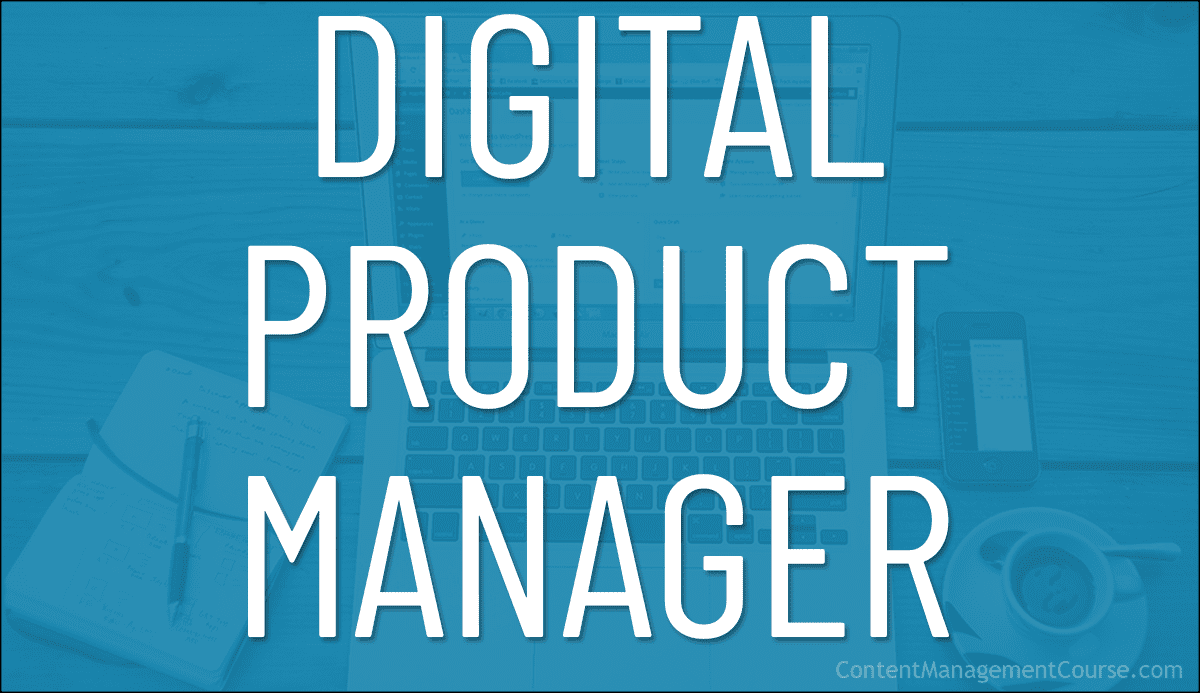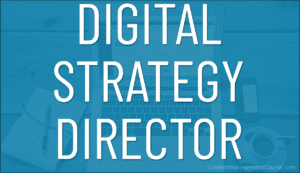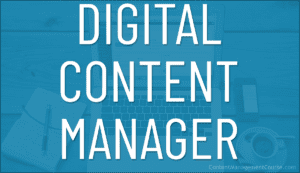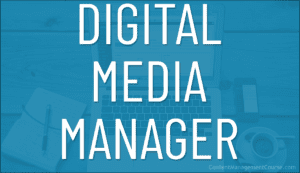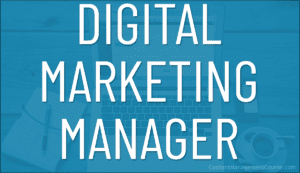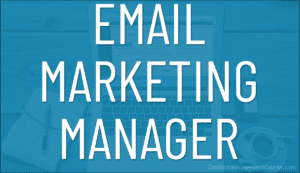Digital Product Manager
Learn about the role and responsibilities of a digital product manager.
 In this section of the Digital Business course module, we look at the role and responsibilities of a digital product manager.
In this section of the Digital Business course module, we look at the role and responsibilities of a digital product manager.
This article is part of our free content management course series where we look at various digital roles and responsibilities that a content manager may need to oversee and assume, depending on the organizational structure of the business.
***
The Role
A digital product manager is a professional who is responsible for overseeing the development and management of digital products for a brand or organization. This may include mobile apps, software, websites, and online services.
The main goal of a digital product manager is to ensure that the digital products they are responsible for meet the needs and expectations of the target audience and align with the brand’s overall business strategy.
To do this, a digital product manager must have a deep understanding of the target audience and the competitive landscape, as well as strong project management skills.
In addition to managing the development and launch of digital products, a digital product manager may also be responsible for conducting market research, analyzing data and user feedback, and continuously improving and updating the products over time. They may also be involved in developing and implementing a product roadmap, which outlines the long-term vision and goals for the product.
Overall, the role of a digital product manager is crucial in helping a brand or organization succeed in the digital world. By overseeing the development and management of high-quality digital products, a digital product manager can help a brand effectively reach and engage with its target audience.
Duties And Responsibilities
Digital product managers are similar to traditional product managers in that they are responsible for developing and launching new products. The main difference is that digital product managers develop digital products like e-books.
Digital product managers are primarily strategists and planners who oversee the development of new online products from inception to launch.
The digital product manager acts as a mediator between consumers and technical teams, communicating consumer needs and translating those needs into new product features for the team to design. Using market data, they manage existing products and identify ways to enhance those products based on public perception.
Duties and responsibilities of a digital product manager include:
- Investigating current trends online
- Reaching out to consumers and finding out what they look for in digital products
- Developing products targeted to various niche groups
- Planning out successful product launch campaigns.
Role Requirements
Recruitment sites advertising the role of Digital Product Manager recommend someone with qualifications in marketing, experience with product marketing and basic web maintenance, and a solid understanding of web development, from coding to layout.
Full-time digital product managers can expect to earn between USD$80,000 and USD$110,000 a year.
Digital Product Manager Role – FAQs
Here are frequently asked questions about the role of Digital Product Manager:
What does a Digital Product Manager do?
A Digital Product Manager is responsible for overseeing the development, launch, and optimization of digital products or features. This includes defining product vision, prioritizing features, collaborating with cross-functional teams, and ensuring the product meets user needs and business goals.
What are the primary responsibilities of a Digital Product Manager?
Primary responsibilities include defining product strategy and roadmaps, conducting market research, gathering and prioritizing user requirements, collaborating with design and engineering teams, managing the product development lifecycle, and analyzing product performance metrics.
What skills are essential for success as a Digital Product Manager?
Essential skills include product management expertise, strong analytical abilities, excellent communication skills, leadership qualities, understanding of UX/UI principles, proficiency in agile methodologies, and the ability to balance user needs with business objectives.
What qualifications are typically required for a Digital Product Manager role?
Qualifications often include a bachelor’s degree in business, computer science, engineering, or a related field. Previous experience in product management, project management, or a related role is usually required. Additional certifications in product management or agile methodologies can be beneficial.
How does a Digital Product Manager collaborate with other teams within an organization?
A Digital Product Manager collaborates closely with design teams, engineering teams, marketing teams, sales teams, and senior leadership to align product development with overall business strategies. They facilitate communication, provide guidance, and foster cross-functional collaboration to achieve product goals.
What tools and technologies does a Digital Product Manager use?
Digital Product Managers use a variety of tools and technologies, including product management software (e.g., Jira, Trello), collaboration tools (e.g., Slack, Microsoft Teams), data analytics platforms (e.g., Google Analytics, Mixpanel), and project management tools (e.g., Asana, Basecamp).
How does a Digital Product Manager prioritize features and requirements?
Digital Product Managers prioritize features and requirements based on factors such as user feedback, market research, business objectives, technical feasibility, and potential impact on the product roadmap. They use data-driven insights to make informed decisions and optimize feature development.
How does a Digital Product Manager measure the success of digital products or features?
Digital Product Managers measure success through key performance indicators (KPIs) such as user engagement, retention rates, conversion rates, customer satisfaction scores, and revenue growth. They analyze data to track product performance, identify areas for improvement, and iterate on product strategies accordingly.
How does a Digital Product Manager adapt to changing market trends and user needs?
Digital Product Managers stay agile by monitoring market trends, gathering user feedback, conducting user research, and staying informed about industry developments. They prioritize flexibility, iterate on product features based on feedback, and pivot strategies as needed to meet evolving user needs.
What are some challenges faced by Digital Product Managers?
Challenges may include balancing conflicting stakeholder priorities, managing complex product roadmaps, navigating resource constraints, overcoming technical challenges, addressing scalability issues, and staying competitive in fast-paced digital markets.
Digital Product Manager – Interview Questions
If you are considering applying for a role as a Digital Product Manager, here are some interview questions you may be asked:
General and Background Questions
- Can you tell me about your experience in digital product management?
- Why did you choose a career in digital product management?
Product Strategy and Vision
- How do you define a successful product?
- Can you describe a time when you had to pivot a product strategy? What was the outcome?
Market Research and User Understanding
- How do you gather and incorporate customer feedback into your product development process?
- Can you provide an example of how you identified a market need and developed a product to meet that need?
Team Collaboration and Leadership
- How do you handle conflicts within your team? Can you provide an example?
- How do you ensure that all team members are aligned with the product vision and goals?
Technical and Analytical Skills
- What tools and methodologies do you use for product management?
- How do you prioritize product features and enhancements? Can you walk me through your process?
Performance Metrics and Success Evaluation
- What key performance indicators (KPIs) do you track for your products?
- Can you describe a time when your product did not meet the expected performance metrics? How did you address it?
Innovation and Problem-Solving
- How do you stay current with industry trends and emerging technologies?
- Describe a challenging problem you faced in product development and how you resolved it.
User Experience and Design
- How do you balance user needs with business objectives when making product decisions?
- Can you give an example of how you improved the user experience of a product?
For more interview questions related to the role of Digital Product Manager, see these resources:
- Digital Product Manager Interview Question Guide [linkedin.com]
- Revealing Product Manager Interview Questions [productplan.com]
- What To Expect In A Product Manager Interview [aha.io]
- The Ultimate List Of Product Manager Interview Questions [productschool.com]
- Essential Product Management Interview Questions [toptal.com]
Related Roles
Digital product managers interact with other roles such as:
- Digital Content Manager
- Content Production Manager
- Product Developer
Source: https://www.marketing-schools.org/careers/digital-product-manager
Useful Resources
We recommend the following resources:
Visit our tools and resources section for additional courses, guides, and helpful tools and resources.
Other Digital Content Related Roles
Click on the links below for more information about other digital content-related roles:

Digital Content Team

Digital Content Strategist

Content Production Manager

Interactive Media Manager

Internet Marketing Director

Content Marketing Specialist
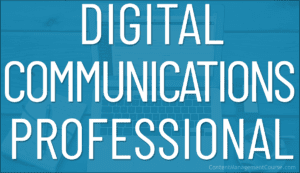
Digital Communications Professional

Search Engine Marketing Director

Internet Marketing Coordinator

Content Outsourcing Resources

Content-Related Jobs and Careers
Return to our content management course outline
***
Image: Pixabay
